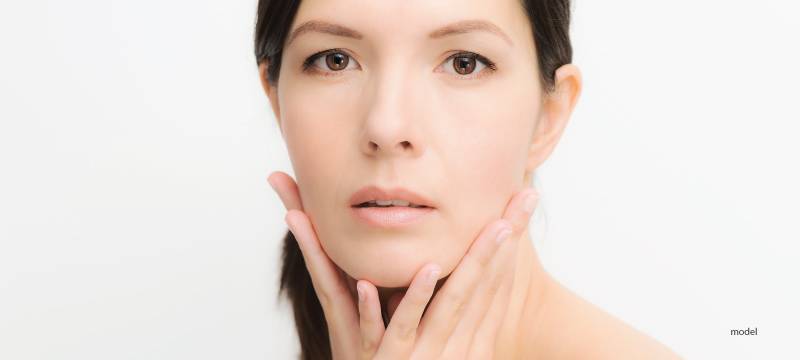Stress And Your Skin: How Cortisol Affects The Skin

Originally published on April 22, 2016. Updated March 11, 2021 to include additional information
Whether stemming from job-related issues, relationship conflicts, or financial problems, stress is very common in many people’s day to day life. Unfortunately all that stress is wreaking havoc on your skin.
The human body naturally responds to periods of stress in a variety of ways, some of which can cause some serious unwanted side effects. Stress triggers the release of hormones and adrenaline, both of which negatively affect our skin. When stress is chronic, inflammation increases and prolongs this detrimental effect. You may notice that you have increased acne breakouts, dryness, irritation, or redness during periods of high stress. These symptoms stem from the release of various hormones when the body encounters stress – in particular, the “stress hormone” cortisol.
Here’s a detailed explanation on the link between stress and your complexion, and why reducing stress leads to healthier skin.
How Stress Affects The Skin
When your body is stressed, you release adrenaline and cortisol, the stress hormone. If you have a healthy stress response, this rise in hormones is temporary and the effect on your skin is minimal. But when a single stressful event is too much to handle, or when we experience repeated exposure to stress, these hormones stay active for too long and wreak havoc on our skin.
Cortisol triggers increased oil production which can clog pores and lead to breakouts. Additionally, chronic stress leads to inflammation. Inflammation not only prevents acne from healing, but can lead to flare-ups of skin conditions such as rosacea, eczema, or psoriasis. Cortisol has even been shown to trigger hair loss.
Stress also speeds up the aging process. When we’re stressed, we experience a decline in the production of collagen, elastin and other skin proteins which reduce the skin’s elasticity and contribute to the formation of wrinkles. Not to mention, we spend far more time frowning or furrowing our brows when under stressful conditions.
Cortisol Can Sabotage Your Skin
Cortisol is a natural hormone that helps the body deal with stress. In small amounts, cortisol is a normal and healthy adaptation reflex. It serves as a great short term coping mechanism.
However, cortisol can turn into an enemy of the skin if it remains in excess over a long period of time. People who are prone to high stress over a long duration will sustain high levels of cortisol, which can negatively affect the skin in various ways:
Acne: You may notice that during periods of high stress you experience more acne breakouts. High cortisol levels prompt the skin’s sebaceous glands to produce more sebum (oil). The additional oil clogs the pores leading to the development of inflammation and bacteria– resulting in acne.
Skin Conditions: Beyond acne, stress can also magnify other skin disorders such as eczema, psoriasis or rosacea. Many people who suffer from chronic skin disorders tend to notice that their symptoms flare up when their stress levels are elevated.
Rashes and Hives: Stress triggers an inflammatory response which can cause redness, rashes, or hives.
Dryness: Inflammatory immune responses may also cause general dryness and itching, as inflamed skin loses the ability to retain water.
Wrinkles: The cortisone hormone caused by stress is a collagen killer. Stress reduces the natural proteins that are responsible for skin elasticity, which speeds up the signs of aging, including wrinkles. Collagen production naturally decreases with age, but consistent stress can speed up the process resulting in early onset aging.
Aging: Cortisol also has the power to accelerate the aging process of the skin, rapidly enhancing common unwanted aging signs like lines and wrinkles, age spots, and skin dullness.
Stress Causes Bad Skin Care Habits
While dealing with stress many people have bad habits that agitate the skin, such as rubbing, scratching, or picking at the skin. All of these habits can lead to cracks in the surface of the skin that will act as channels for dirt and bacteria to penetrate. This can result in increased acne, red bumps, blemishes and skin infections. Continually traumatizing the skin with these bad habits also prolongs the healing process, thus possibly leading to scarring and brown/red spots that can linger longer making the skin appear more uneven in tone and texture.
Stress can cause people to choose less healthy lifestyle. Sugary cravings, increased appetite, as well as alcohol and tobacco use can lead to more oxidative damage to cells and thus lead to premature agining of the skin and decreased healing capabilities. This can affect multiple organ systems- your skin being your largest organ system.
During stressful times many people deviate from their normal skincare regimen or skip it all together. Not taking proper care of your skin can lead to issues, especially since stress alone ignites skin problems as outlined above.
Stress Is Even Linked To Skin Cancer Development
A 2005 study showed that long-term exposure to high levels of stress can actually increase the chances of developing skin cancer. Additionally, stress has been shown to speed up the spreading of cancerous cells throughout the body.
What can you do about stress? Take steps to minimize unnecessary stressors in your life while also handling stress better. Here are some suggestions:
- Exercise regularly. Physical activity is proven to alleviate the effects of stress on the body.
- Incorporate “me time” into your day. Regularly taking time to do things you enjoy will help.
- Try stress relief techniques such as yoga, breathing exercises, and meditation.
- Get plenty of sleep each night and drink lots of water
- Develop a sound support system.
Keeping Stress Under Control
Stress is always going to be an inescapable part of living. However there are some simple and effective ways to help your body (and skin) better deal with stress:
Maintain a Skin-Care Routine
If you’re stressed, you may not feel like washing off your make-up at night or making time for a morning skin-care routine. But these practices do more than protect your skin. A daily skin-care routine gives you a chance to slow down, relax and practice self-care, thereby reducing your stress.
Eat Well and Exercise Daily
Eating healthy, whole foods reduces the inflammation that’s triggered by stress. Exercise is a great way to discharge stress hormones, and can help boost your energy and mood. The better your physical health, the less dramatically your body will react in acute moments of stress.
Get Plenty of Sleep
If you’re not getting 7-10 hours of sleep each night, very little else you do for your health will matter. Sleep is vital for protecting and healing the body and mind, and helps increase your resilience to stress.
Practice Yoga and Meditation
Yoga, meditation and other body-mind practices help you connect to calm in moments of stress. These ancient arts will also teach you how to transform your reactions into calm, measured responses.
Find Methods of Self-Care
Schedule time each week to participate in activities which fill you with energy, versus depleting you. Read a book, take a warm bath, go for a hike, or enjoy brunch with friends.
Choose Valuable Coping Skills
When the going gets tough, turning to a counselor, therapist, or spiritual advisor is far more beneficial than escaping with drugs or alcohol. These vices not only cause more problems than they solve, but they’re terrible for your skin!
Reducing stress should be a health priority at any age. Not only will your quality of life improve, but so will your skin.
Treatments That Reverse Stress Damage
Beyond practicing stress coping techniques, there are also many great cosmetic treatments that work to both help the skin deal with stress and reverse any negative effects. Great stress fighting treatments include:
Chemical Peels: Topically applied formulas that revitalize the skin surface by creating an even and controlled shedding of the skin cells. Chemical peels create a fresh appearance and a smoother skin surface while removing skin damage.
Micro-Needling: An innovative skin rejuvenation treatment that spurs the production of new collagen and elastin fibers that thicken the skin and reduce the appearance of wrinkles, acne scarring, sun damage, and stretch marks. Learn more about micro-needling.
Facials: We offer several different types of facials to leave the skin feeling refreshed and renewed. Facials can be performed to cleanse, exfoliate, and rehydrate the skin.
Laser Treatments: Non-invasive treatments utilize light, ultrasound, or radiofrequency to tighten or resurface the skin. Laser treatments like Thermage and Ultherapy can stimulate the production of new collagen while resurfacing lasers like Fraxel can improve the appearance of aging or sun damaged skin, fine lines and wrinkles, acne scars, stretch marks or uneven pigmentation.
Disclaimer: The contents of the Westlake Dermatology website, including text, graphics, and images, are for informational purposes only and are not intended to substitute for direct medical advice from your physician or other qualified professional.
